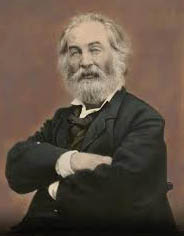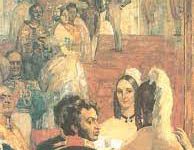The Love of Walt Whitman
(The Love Story of Walt Whitman)
Walt Whitman
The Love of Walt Whitman
Walt Whitman was one of the greatest poets in the world. As a poet, both in theme and style, he was exceptionally a queer poet as he wrote poetry on the common themes of democracy and natural freedom in an unprecedentedly new prosaic style which was his own innovation. By means of the taste of his exceptionally common themes and innovative style he got worldwide popularity and eventually he was hailed as the National Poet of America.
This great poet of America, Walt Whitman remained as a bachelor for his whole life. But it did not mean that the sense of love (especially sexual love) had not come to him. As he began to grow young the sense of sexual love grew stronger in him. But the sense of his love was queerly an exceptional one. He threw away all the existing conventions of love. Throughout his life, he could not love any definite woman. Instead, he loved both men and women. His love for men and women was more and more carnal. To him love was a physical need and to meet it there were no definite means—any man or woman was enough to quench the amorous thirst. He himself was homosexual and preferred the company of men much more to the company of women. Hence, his sense of sexual love was antisocial, antireligious and anti-humane. In brief, to say, his sense of love was immoral, barbarous and worthy of being hated.
In his personal life, he was fickle-minded and could not stick to any fixed job or work for a long period of time. Hence he had to move often, from place to place, and had to do many jobs. In 1848 he went to New Orleans where he worked for some months on a newspaper called The Crescent. There he came to an attachment with a Creole woman. He made a sexual relationship with her. His relationship with her was sexual and for part-time entertainment. Besides Creole women, he had gone to the touch of many other women during his stay at several places. Often it was charged against him that he had become the father of six illegitimate children.
In his writings, he advocated greater sexual freedom and tolerance. In the matter of personal companionship, he preferred uneducated working men and developed homosexuality with them.
Walt Whitman never proposed marriage to any woman. But several proposals of marriage to him came from some women. Among them, there was an English lady whose name was Anne Gilchrist. She was the widow of William Blake’s famous biographer, Alexander Gilchrist. She had a strong literary interest and had gone through Whitman’s Leaves of Grass, a collection of poems. Going through the poems of this anthology, her interest grew in him. She wrote a critical appreciation of his poems and pushed up the sale of his book in England. She fell in love with his poetic creation and wrote several passionate letters to him. Whitman replied to her but his replies were polite and restrained. Eventually, Anne Gilchrist went to America with the intention of marrying him. There she became the first and foremost partner of the poet and comforted him during his old ages. Though Anne Gilchrist desired much to enter into a marriage bond with the poet, yet the poet did not marry her.
Because of his immoral attitude towards love and life he had to suffer much in life. His poetry books especially, ”The leaves of Grass” was proscribed by church officials. Once he had been expelled from his government job in the office of the Attorney General.
This great poet with a wild sexual creed died on March 26, 1892, in Camden.
In many of his poems, Walt Whitman has portrayed his wild attitude to love and sex. His love poems are highly amorous, passionate and barbarous. In the poem, I Sing the Body Electric he glorifies and exalts the human body forgetting the greatness of the human soul. He writes:
“Have you ever loved the body of a woman?
Have you ever loved the body of a man?
If anything is sacred the human body is sacred.”
In the poem, ‘Once I passed through a Populous City’ he writes about his queer and fickle passion for a woman as:
“I remember I say only that woman who passionately clung to me,
Again we wander, we love, we separate again,
Again she hold me by the hand, I must not go
I see her close beside me with silent lips sad and tremulous.”
In the poem, ‘A Woman Waits for Me’, he writes giving much emphasis on physical love, as-
“A woman waits for me, she contains all, nothing is lacking,
Yet all were lacking, if sex were lacking, or if the moisture of the right man were lacking
Sex contains all, bodies, souls
Meanings, proofs, purities, delicacies, results, promulgations, seminal milk.”
Walt Whitman liked the warm-blooded active woman. He writes in the same poem:
”Now I will dismiss myself from impassive women,
I will go, stay with her who waits for me,
And with those women that are warm-blooded
And sufficient for me.”
Though Walt Whitman was a bachelor, he never hesitated to sleep with a woman in the same bad. He says,
“I draw you close to me, you women
I cannot let you go, I would do you good
I am for you, and you are for me,
Not only for our own sake but for other’s sake.”
The poet is very passionate about sexual intercourse. He writes in the same poem,
“I don’t hurt you any more than is necessary for you,
I pour the stuff to start sons and daughters fit for these states.”
All the poems dealing with the theme of love are reflections of the poet’s own life and philosophy. Though his love poems are immoral and inhumane, yet he, as a love poet, is exceptionally greater in the whole range of world love poets. 0 0 0
Walt Whitman
N.B. The article ‘The Love of Walt Whitman’ originally belongs to the book ‘Love of Reputed Persons‘ by Menonim Menonimus.
Walt Whitman
Books of Composition by M. Menonimus:
- Advertisement Writing
- Amplification Writing
- Note Making
- Paragraph Writing
- Notice Writing
- Passage Comprehension
- The Art of Poster Writing
- The Art of Letter Writing
- Report Writing
- Story Writing
- Substance Writing
- School Essays Part-I
- School Essays Part-II
- School English Grammar Part-I
- School English Grammar Part-II..
Books of S. Story by M. Menonimus:
Related Search:
- 25 Best Love Quotes
- Greatest Real-Life Love Stories
- Psychology of Love
- Beautifully Written Love Stories
- The Secret Lives of Writers











